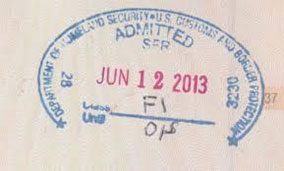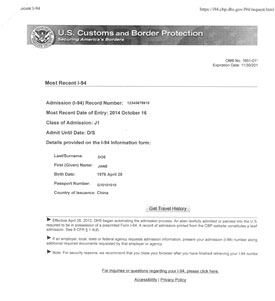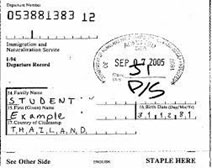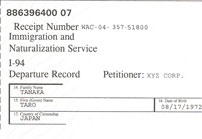Travel Within the United States
For travel within the United States, we suggest you carry your immigration documents in a safe place: valid passport, I-94 card/printout, I-20/DS-2019/copy of I-797 approval.
If you travel to Puerto Rico, the U.S. Virgin Islands, or the Northern Mariana Islands, you are not required to carry a valid visa unless you travel to other countries while going to, or coming from, those locations; you will, however, need to carry your valid immigration documents.
Traveling Abroad
If you are an international student in F-1 or J-1 status, you and your dependents need the following documents to re-enter the United States and resume studies or Optional Practical Training (OPT)/Academic Training (AT):
- I-20/DS-2019 with a valid travel signature signed within the last 12 months (if you are a continuing student) or signed within the last six months if on OPT/AT
- Valid visa stamp
- A passport that is valid at least six months after the date of your return to the U.S.
- Evidence of financial support
- SEVIS (I-901) fee receipt
- A copy of your current enrollment at Illinois Institute of Technology or proof of employment if on OPT/AT as listed below.
Additional Documents for those OPT/AT:
- Employment Authorization Document (EAD) card or Academic Training DS-2019; note: all EAD cards say “not valid for re-entry,” which means that the card alone does not guarantee re-entry
- Offer letter or proof of employment (recent pay stubs or employment verification letter)
If you are in J-1 status as a short-term scholar, research scholar, or professor, you and your dependents need the following documents to re-enter the United States and resume your activity:
- DS-2019 with a valid travel signature signed within the last six months (short-term scholar) or 12 months (research scholar or professor)
- Valid visa stamp
- A passport that is valid at least six months after the date of your return to the U.S.
- Letter from your host department confirming your activity at Illinois Institute of Technology
If you are in H-1B status at Illinois Institute of Technology, you and your dependents need the following documents to re-enter the United States and resume employment:
- Valid passport
- Original I-797 Approval Notice
- I-94 card issued for H-1B
- Recent paystub
- Current letter of employment
- Copy of I-129 and Labor Condition Application from the Office of Global Services
- Submit a Reprint I-20/DS-2019 Request through the ISSS Portal. The request will be processed within 7 business days, and the I-20/DS-2019 will be available for download on the ISSS Portal.
- Student and Exchange Visitor’s Program (SEVP) has authorized all U.S. institutions, including Illinois Tech the ability to permanently issue electronic form I-20s/DS-2019s to all international students indefinitely. Please note that this means U.S. local, state, and federal agencies no longer require the “original” copy of your Form I-20/DS-2019 but instead accept a "printed" copy of your Form I-20. You do not have to pay for shipping of your Form I-20 as we will not be able to mail/ship them to you.
You may need a visa to enter Canada, Mexico, or the adjacent islands as they each have their own immigration systems, as well as individual agreements with countries regarding visas.
Adjacent islands include Saint Pierre; Miquelon; the Dominican Republic; Haiti; Bermuda; the Bahamas; Barbados; Jamaica; the Windward and Leeward Islands; Trinidad; Martinique; and other British, French, and the Netherlands territories or possession in or bordering the Caribbean Sea, except Cuba.
For additional information regarding entry requirements specific to Canada or Mexico, please see the following sources:
- Canada: Citizenship and Immigration Canada: www.cic.gc.ca/english/visit/visas.asp
- Mexico: Consulate General In Chicago (“Visa Section”): https://consulmex.sre.gob.mx/chicago
Note: For those in H-1B and H-4 status, Automatic Visa Revalidation only applies to travel to Canada and Mexico. A valid visa will be required to return from the adjacent islands.





